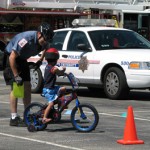Remember when the duty of a police force was to “protect and serve”? It seems we are moving away from this smiling face officer, ready to help a child find it’s lost dog or a woman locked out of her car, and into a job description that would be more aptly described as to “protect (some people) and arrest”. In Indianapolis, that changing role is growing even further as the police are outsourcing some of their more “service” oriented roles.
According to the Indy Star, having fewer police on the force has required the city’s police department to do less in the way of public service while focusing mostly on emergency response and arrests. They say that by utilizing nonprofit organizations and professionals within the community, they can continue to connect the people of Indianapolis to the help they need.
 This includes steering people towards organizations that can assist with hunger, mental health programming, drug-alcohol assistance, and community assistance for teens.
This includes steering people towards organizations that can assist with hunger, mental health programming, drug-alcohol assistance, and community assistance for teens.
“Police cannot do by themselves all that needs to be done to address the causes for crime in our community,” Public Safety Director Troy Riggs said. “We cannot arrest our way out of the problem. We need true community partners. The factors are more nuanced and complex than any one police department is capable of handling.”
In two particular areas, growing crime is a top concern. Those areas are among teens and the mentally ill. The department believes they can help prevent the sort of emergency police contacts that can lead to arrests and violence, if they get “all hands on deck” in the prevention stage.
Specialists with Midtown Community Mental Health, for instance, sift through the arrest records for those who were arrested for mental health issues. Then, they call the arrestees and try to make sure they have the help they need, providing counseling and other resources if necessary.
“We want to get them help so a dangerous situation doesn’t happen in the future, where they can hurt someone or themselves,” said Rebekah Bricker of the organization.
Youth advocates are also meeting with police, teaching them how best to communicate with teens in order to avoid confrontations and situations that would lead to juvenile arrests.
The police are less about “serving” and more about arresting now. Part of this is due to the never-ending list of criminal laws they are tasked with enforcing; some of it is due to the sort of militaristic cop that is encouraged in this day and age, and some of it is because departments simply don’t have the money to focus on prevention.